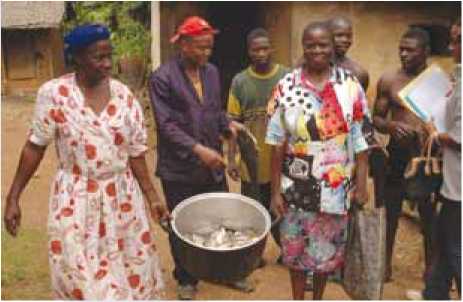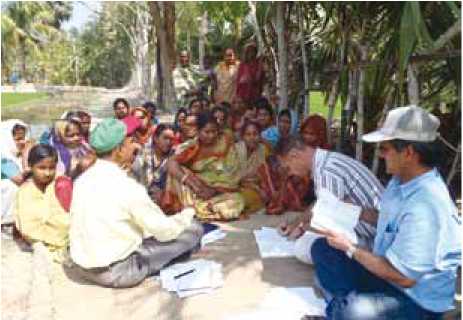Gender and aquaculture:
Sharing the benefits from fish farming equitably

cooperative women’s groups have rather
led to increased friction and tension among
women fish traders (Walker, 2001). There
is also an underlying gendered assumption
that women welcome participation in groups
and cooperate well together. In analyzing
the context of fish processing, the nuanced
understanding of gendered impacts already
explored in other settings, for example
garment and electronics factories could
lend valuable insights.
Networks are usually characterized by
asymmetrical power relations. Of concern
here is the power to access livelihood
resources and opportunities, as well as the
capability to negotiate within institutions and
make decisions over livelihood choices that
can enable women and men to move out of
poverty. The way gendered networks might
be used in aquaculture communities to exit
poverty is currently unknown.
Networks and identities have gendered
consequences in fishing communities
and can affect the ability of individuals
to cope with or rise out of poverty. Do
formal organizations improve livelihoods
and bargaining power or do they exclude
certain members of communities from the
benefits they were receiving from previous
informal arrangements? We need more
comprehensive work on how membership to
networks can affect the livelihoods of men
and women in fish farming communities.
Theme 4: Governance and rights
Governance regimes affect access to,
control over and management of resources
in aquaculture communities around the
world. Co-management and community-
based management have emerged as
important efforts to shift from a top-down,
command and control approach to one in
which decisions about use of resources and
receiving benefits are devolved to the people
who depend on them for their livelihoods.
However, co-management can exclude some
groups of people and privilege others.
New governance systems can come
up against traditional local governance
structures, local patronage systems and
national institutions. In some cases,
these other institutions have undermined
community-based initiatives and caused
them to fail. In other instances, development
projects which have aimed at improving
management have actually undermined or
reduced the roles and decision-making
powers that women previously had. Research
on governance and rights needs a better
grasp of how men and women participate in
governance structures from local to national
level. While community-based aquaculture
management has attempted to devolve more
authority to small-scale producers, it might
still be difficult for women to participate in
these new structures because of cultural and
practical constraints.
We need more analysis of the gendered
nature of access to land and the potential
conflicts arising from the construction of fish
ponds. More attention to how pond tenure
and land tenure complement or conflict
with each other would inform us about
how aquaculture is integrated with existing
natural resource management and livelihood
strategies.
Where programs have been designed to
increase women’s participation in fisheries
management, evaluations of their success

More intriguing information
1. IMPROVING THE UNIVERSITY'S PERFORMANCE IN PUBLIC POLICY EDUCATION2. An Empirical Analysis of the Curvature Factor of the Term Structure of Interest Rates
3. Design and investigation of scalable multicast recursive protocols for wired and wireless ad hoc networks
4. Word searches: on the use of verbal and non-verbal resources during classroom talk
5. The name is absent
6. Text of a letter
7. Wirkung einer Feiertagsbereinigung des Länderfinanzausgleichs: eine empirische Analyse des deutschen Finanzausgleichs
8. Implementation of Rule Based Algorithm for Sandhi-Vicheda Of Compound Hindi Words
9. The name is absent
10. Convergence in TFP among Italian Regions - Panel Unit Roots with Heterogeneity and Cross Sectional Dependence